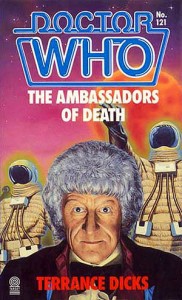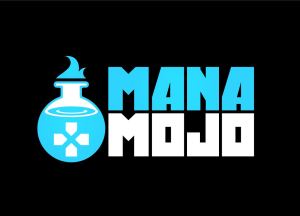 Welcome to the twenty-seventh instalment of Who Review. This week, the Doctor becomes embroiled in the mystery of The Ambassadors of Death
Welcome to the twenty-seventh instalment of Who Review. This week, the Doctor becomes embroiled in the mystery of The Ambassadors of Death
EPISODES
The Ambassadors of Death (7 Episodes)
BROADCAST DATES
21 March – 02 May 1970
THE DOCTOR
Jon Pertwee
THE COMPANIONS
Liz Shaw
THE EPISODES
Before we begin, I’d like to say a special thanks to friend of Who Review Melthoid, who provided me with a VHS copy of Ambassadors of Death. This review wouldn’t be possible without his generous assistance.
I should point out that because of this I watched a B&W version of the story, with some editing from the Australian Censorship Board. Most of the story remains intact.
Man has sent its first mission to Mars as part of the Discovery mission. Unfortunately, British Space Centrelost contact with the Mars Discoveryprobe months ago, and a new rocket, Recovery 7 has been launched to retrieve the Discovery rocket. The project is being overseen by Professor Ralph Cornish, and UNIT have been called in to act as security.
TheRecovery 7 probe locks onto Discovery and the pilot attempts to enter the rocket. A high pitched screeching rings out and communication with the astronaut is lost.
Watching the BBC broadcast on television, the Doctor realises he has heard the high-pitched whining before, but can’t determine where. He and Liz travel to Space Centre and arrive in time to hear the sound again. The Doctor determines that it is a coded communication being broadcast from the Discovery. When a third noise is heard, he further determines that it is a different broadcast, a response to the initial communication and one that is being broadcast from Earth!
Using Space Centre facilities and a network of satellites, the Doctor and UNIT are able to pinpoint the broadcast to a warehouse in London. UNIT stages a raid on the building, battling a team of armed soldiers organised by General Charles Carrington, a former astronaut and Mars Discovery team member. While some prisoners are taken, Carrington manages to escape, and his culpability remains unknown to UNIT and the Doctor.
Meanwhile, the Recovery 7 probe returns to Earth and is retrieved by UNIT soldiers. A troop of Carrington’s men stage an ambush and steal the probe, but the Doctor is able to retrieve it. He returns it to British space control, but when the probe is opened they discover it is empty; the three Mars astronauts are missing. It soon becomes apparent that Carrington’s men smuggled the astronauts out during the ambush.
Carrington’s men take the astronauts to a secure site, where they begin feeding them radiation to keep them alive. Meanwhile, the Doctor is introduced to Carrington himself by Sir James Quinlan, the Minister of Technology, who reveals that Carrington is the head of the newly formed Space Security Department . Carrington explains that his actions were necessary to protect the astronauts, who have become infected with contagious radiation. Quinlan tells the Doctor that he didn’t wish the public to become panic-stricken, so he has personally authorised all of Carrington’s actions.
Carrington takes the doctor, Liz and the Brigadier to see the astronauts, only to discover that they have been abducted by a criminal called Reegan. Examining the data on the astronauts, the Doctor determines that no humans could have survived the massive amounts of radiation present. He determines that the three astronauts must still be trapped on the Discovery probe, and that their space suits have been taken by three alien beings. He tries to convince Professor Cornish and General Carrington to launch another rescue mission, but Carrington will have none of it. The Doctor is suspicious and rightly so, as Reegan is working with Carrington.
Meanwhile, Reegan and his men smuggle the alien astronauts to a hidden location, where Lennox, a disgraced Cambridge professor, is waiting. Under Reegan’s order, Lennox keeps the aliens alive while they remain incarcerated. Reegan also stages the kidnapping of Liz Shaw to aid Lennox in creating a device to communicate with the aliens, which they succeed in doing.
With the aliens now under his control, Reegan sends them to attack space command, hoping to disrupt UNIT and the Doctor’s activities. Sir James Quinlan is killed in the attack.
Despite Carrington’s continued interference, Professor Cornish decides to launch another rescue mission and the Doctor volunteers to pilot the rocket to Discovery 7. Under Carrington’s orders, Reegan attempts to sabotage the takeoff, but fails. The doctor manages to make it to orbit around Mars, where he discovers an enormous starship. Drawn inside, he finds the missing astronauts, who have been deluded into believing they are in quarantine on Earth.
The Doctor also encounters an alien being, who explains that the astronauts are being imprisoned pending the safe return of three alien ambassadors sent to Earth. The being explains that a treaty has been created between the aliens and mankind, but the terms of the agreement have been broken due to the imprisonment of the ambassadors. If the ambassadors are not freed, the aliens will destroy the Earth. The Doctor gives his personal guarantee to aid in the safe return of the Ambassadors and is permitted to return to Earth.
Landing back on Earth, the Doctor is kidnapped by Reegan and taken to the criminal’s secret HQ. There, the Doctor discovers that Carrington is the mastermind of the whole affair. The General reveals that he first encountered the aliens when he was pilot of the Mars 6 probe and that his co-pilot was killed on contact with the aliens. Carrington believes that the aliens are secretly planning an invasion, and he agreed to the initial treaty only so that he could prepare counter measures to stop them. The ambassadors were lured to Earth and forced to kill so that Carrington could muster public support for his counter-attack. The next step in his plan is to force one of the Ambassadors to confess to the invasion on public television and rally the governments of the Earth to Carrington’s cause.
Carrington plans to kill the Doctor, but Reegan convinces him that the Doctor and Liz can devise a more complex communication device to control the aliens. Carrington leaves, returning to Space Centre to prepare for the television broadcast. There, he arranges for a television reporter and film crew to be present for the broadcast. The reporter is uncertain about the General’s actions, and the Brigadier tries to convince him to halt of delay the broadcast, but to no avail.
Rather than create a new communication device to control the Ambassadors, the Doctor sends a message to UNIT instead, and a UNIT team soon rescues them. Reegan and his men are taken into custody.
The Doctor rushes to Space Centre, where he and the Brigadier manage to take Carrington into custody before he can begin his broadcast. He is taken away, maintaining that he was performing his moral duty to protect the Earth. The Doctor comments that he understands
The Doctor arranges for Professor Cornish and Liz to return the Ambassadors to their own people, after which the three human astronauts will be returned unharmed.
MY THOUGHTS
Ambassadors of Death begins with a compelling mystery: what has happened to the astronauts of Discovery 7? It builds beautifully on that mystery, constantly keeping us guessing as to the identity and nature of the astronauts/Ambassadors.The human conspiracy involving Carrington and Reegan adds another layer of intrigue, making this storyline one of the more interesting and complex of Pertwee’s first season.
Unfortunately, there are a few too many tangents and subplots to make this one of the genuinely great Who storylines. As with many of the longer stories, there seems to be a little too much padding in the middle episodes, drawing the story out more than is necessary. This could be due to the development of the story itself. Originally, Ambassadors was written by David Whitaker as a story for Patrick Troughton, set centuries in the future. When Troughton and his companions left the series and the new earth-based format was developed, the script was quickly reworked by script editor Terrence Dicks and writer Malcolm Hulke, who rewrote most of the story. I think it shows in the finished product.
What does make Ambassadors stand out is the moral core of the story. Unlike most Who storylines, the aliens here are perfectly benevolent and in the right, while human xenophobia and paranoia is the true threat. Unfortunately, outside of Carrington, this aspect of the story isn’t really explored in great detail.
At the beginning of the first episode, the Doctor is still angry at the Brigadier’s apparent destruction of the Silurians in the previous story. It’s ironic that the Brigadier’s justification for his actions is somewhat similar to General Carrington’s in Ambassadors, although this irony isn’t really followed through in any substantive way.
Also, very little is revealed about the aliens themselves. In some respects, this is understandable, as the real story centres around Carrington and his actions. I’d have liked to have learned more about the Ambassadors though, if not here then perhaps in a later episode. Unfortunately, this is their only appearance to date and the lingering questions posed at the conclusion of the episode were never followed through.
An interesting bit of trivia: the reporter involved in the television broadcast is played by Michael Wisher. While Wisher made numerous appearances in Doctor Who, he is best remembered as the first actor to portray Davros in Genesis of the Daleks.
While the ending of Ambassadors is powerful, with the Doctor understanding Carrington’s actions without condoning them, it does feel a little rushed.
THE DOCTOR
The Doctor is full of all kinds of new tricks and skills in Ambassadors. We learn that he can pilot rockets solo and that he can seemingly make objects disappear and reappear via “transmigration of matter.” Of course, it begs the question why he’s never used this ability before.
I love Pertwee’s man of action approach of the Doctor, but I wonder about the addition of these new abilities. There are times when it seems the Doctor develops abilities to suit the needs of the script, but these abilities are quickly forgotten by the next storyline.
On a positive note, Pertwee is really developing a strong personality and forthrightness in his depiction of the Doctor.
THE COMPANIONS
Despite the Doctor’s distain for the Brigadier’s action at the end of The Silurians, there is still a slowly developing sense of camaraderie between the two. This relationship is quickly forming the core of the series. It’s unfortunate the same cannot be said for the Doctor and Liz.
UNIT’s abilities and mandate also become clearer with each story, and here we begin to see just how powerful an organisaiton they are. The Brigadier states at one point that he can hold prisoners on security charges “for a very long time”, drawing interesting parallels with modern security and detention laws.
Corporal Benton, last seen in The Invasion, makes his return to the series, now sporting the rank of Sergeant. From this point on he remains a core supporting cast character for the duration of the UNIT era.
THE VILLAINS
Ambassadors of Death is unlike most Doctor Who storylines, in that the aliens are not the villains. The “evil” in this story lies in the xenophobia of General Carrington and the actions his paranoia and hatred lead him to. Despite this, Carrington still evokes some level of sympathy; he is clearly blinded by his hatred but believes his actions are in the best interests of mankind. He isn’t evil per se, simply misguided.
FINAL THOUGHTS
The Ambassadors of Death is a flawed masterpiece with a strong social message of tolerance and understanding. Unfortunately, the message is stronger than the execution of the plot, leaving a certain level of dissatisfaction once the story is complete.
3.5 Lukes
NEXT
We bring Jon Pertwee’s first season as The Doctor to a close with the alternate reality adventure Inferno.








